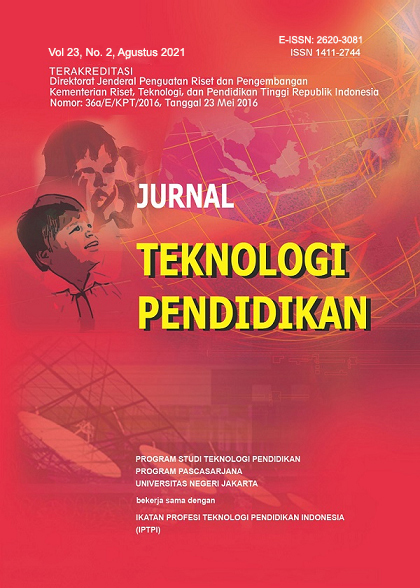The Effect of E-Module TRIAD Kesehatan Reproduksi Remaja (KRR) on HIV Self-Efficacy in Preventing HIV Vulnerable Behaviour
DOI:
https://doi.org/10.21009/jtp.v23i2.20111Keywords:
e-module, HIV, risk behaviour, self-efficacy, studentsAbstract
HIV infection is one of the three threats to reproductive health in adolescents (TRIAD Kesehatan Reproduksi Remaja). In order to reduce this risk to adolescents, a strategy is needed to prevent this problem by providing education through electronic modules or e-modules. Education with e-modules is expected to increase adolescent self-efficacy in preventing HIV risk behaviour. This study purpose was to determine the effect of education through e-module on changes in self-efficacy to prevent HIV risk behaviour in adolescents. This quantitative study used a single group pretest-posttest research design. The sample in this study were VIII grade junior high school students at one of the private schools in Bandung Regency which consisted of several classes by providing education using e-modules. There were 40 students involved in this research. The intervention given to students was education about the dangers of HIV and risk behaviours using E-Module of TRIAD Kesehatan Reproduksi Remaja. Meanwhile, the instrument used in the study was the self-efficacy assessment instrument for the prevention of HIV-risk behaviour. The results of the study found that there was a change in the scores of self-efficacy in the prevention of HIV risk behaviour in students, before and after education through e-modules. Therefore, it can be concluded that e-module is effective in increasing adolescent self-efficacy. The results of this study become recommendations for academics and practitioners who are involved in the health sector for adolescents to implement an intervention to prevent risky behaviours that threaten adolescents, especially in relation to HIV/AIDS problems.
References
Annisa, W. (2010). Metode Penelitian Korelasional.
Block, M. E. (2016). A Teacher’s Guide to Adapted Physical Education. Paul H. Brookes Publishing.
DKB, D. K. B. (2007). Psikologi pendidikan.
Dweck, C. S. (2000). Self-theories: Their role in motivation, personality, and development. Psychology press.
Hakim, T. (2005). Belajar secara efektif. Niaga Swadaya.
Husdarta, J. S., & Kusmaedi, N. (2010). Pertumbuhan dan Perkembangan Peserta Didik: Olahraga dan Kesehatan. Bandung: Alfabeta.
Husdarta, J. S., & Riduwan. (2010). Sejarah dan Filsafat Olahraga. Alfabeta.
Lengkana, A. S., Tangkudung, J., & Asmawi, M. (2018). THE EFFECT OF POWER LIMBS, SPEED REACTION, FLEXIBILITY AND SELF CONFIDENCE ON THE ACHIEVEMENT OF ELITE ATHLETES ATHLETIC WEST JAVA IN THE TRACK NUMBER. JIPES-JOURNAL OF INDONESIAN PHYSICAL EDUCATION AND SPORT, 4(2), 20–25.
Machida, M., Marie Ward, R., & Vealey, R. S. (2012). Predictors of sources of self-confidence in collegiate athletes. International Journal of Sport and Exercise Psychology, 10(3), 172–185.
Muilenburg, L. Y., & Berge, Z. L. (2005). Student barriers to online learning: A factor analytic study. Distance Education, 26(1), 29–48.
Priastuti, A. W., & HW, S. (2016). Dukungan Fasilitas dan Lingkungan Keluarga terhadap Prestasi Belajar Matematika di SMP.
Rothman, T., Maldonado, J. M., & Rothman, H. (2008). Building self-confidence and future career success through a pre-college transition program for individuals with disabilities. Journal of Vocational Rehabilitation, 28(2), 73–83.
Tongco, M. D. C. (2007). Purposive sampling as a tool for informant selection. Ethnobotany Research and Applications, 5, 147–158.
Unver, V., Basak, T., Watts, P., Gaioso, V., Moss, J., Tastan, S., … Tosun, N. (2017). The reliability and validity of three questionnaires: the student satisfaction and self-confidence in learning scale, simulation design scale, and educational practices questionnaire. Contemporary Nurse, 53(1), 60–74.
Winarno, M. E. (2006). Dimensi Pembelajaran Pendidikan Jasmani dan Olahraga. Malang: Laboratorium
Downloads
Published
How to Cite
Issue
Section
License
Jurnal Teknologi Pendidikan is an Open Access Journal. The authors who publish the manuscript in Jurnal Teknologi Pendidikan agree to the following terms.
Attribution-ShareAlike 4.0 International (CC BY-SA 4.0)
-
Attribution — You must give appropriate credit, provide a link to the license, and indicate if changes were made. You may do so in any reasonable manner, but not in any way that suggests the licensor endorses you or your use.
-
ShareAlike — If you remix, transform, or build upon the material, you must distribute your contributions under the same license as the original.
- No additional restrictions — You may not apply legal terms or technological measures that legally restrict others from doing anything the license permits.
Notices:
- You do not have to comply with the license for elements of the material in the public domain or where your use is permitted by an applicable exception or limitation.
- No warranties are given. The license may not give you all of the permissions necessary for your intended use. For example, other rights such as publicity, privacy, or moral rights may limit how you use the material.








